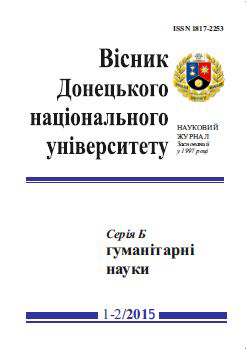Про часовий вимір соціальних структур.
Ключові слова:
соціальна структура, соціальні відносини, соціальна позиція, складність, темпоральністьАнотація
За умов кардинальних соціокультурних трансформацій та подальшого ускладнення соціального життя проблематизуються класичні категорії соціального аналізу, внаслідок чого виникає потреба в їх перегляді та удосконаленні. Дана стаття присвячена дослідженню такого фундаментального поняття соціальних дисциплін, як “соціальна структура”. На думку автора, актуальний розвиток соціальної теорії спонукає до уточнення змісту цього поняття шляхом врахування темпоральних та процесуальних характеристик.Посилання
Аберкромби Н., Хилл С., Тернер Б.С. Социологический словарь / Пер. с англ. — М.: Экономика, 2004. — 620 с.
Штомпка П. Социология. Анализ современного общества/ Пер с польск. — М.: Логос, 2005. — 664 с.
Фадєєв В.Б. Між структурою і дією: витоки теорії соціальної практики// Соціальні практики в глобальному вимірі. — К.: Інститут філософії імені Г.С.Сковороди НАН України, 2009. — С.28-46
Бхаскар Р. Общества/ Пер. с англ.// Социо-логос. Вып. 1. — М.: Прогресс, 1991. — С.219-240.
Арчер М. Реализм и морфогенез/ Пер. с англ.// Теория общества. — М.: Канон-Пресс-Ц, 1999. — С.157-195
Гидденс Э. Устроение общества: Очерк теории структурации/ Пер с англ. — М.: Академический проект, 2003. — 528 с.
Урри Д. Социология за пределами обществ: виды мобильности для ХХІ столетия/ Пер. с англ. — М.: ВШЭ, 2012. — 336 с.
Бек У. Общество риска. На пути к другому модерну. / Пер. с нем. — М.: Прогресс- Традиция, 2000. — 384 с.
Бергер П.А. Индивидуализация и изменение значения социальних неравенств/ Пер. с нем.// Социальное неравенство. Изменения в социальной структуре: европейская перспектива. — СПб.: Алетейя, 2008. — С. 12-24
Дзоло Д. Демократия и сложность: реалистический подход/ Пер. с англ. — М.: ВШЭ, 2010. — 320 с.
Макеев С. Неравенство в социологической перспективе// Новые социальные неравенства. — К.: Институт социологии НАН Украины, 2006. — C.14-42.

